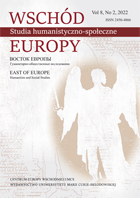Polska dyplomacja wobec Związku Radzieckiego
po przewrocie majowym
Polish diplomacy towards the Soviet Union after the May Coup
Author(s): Artur ŻyckiSubject(s): History, Political history
Published by: Wydawnictwo Naukowe Uniwersytetu Marii Curie-Sklodowskiej
Keywords: Sanation; diplomacy; Polish-Soviet relations; non-aggression pact
Summary/Abstract: The May Coup did not initially bring about any major changes in Polish foreign policy, although the post-May governmental circles put a stronger emphasis on the Promethean idea and the concept of the Intermarium. In mutual relations between Warsaw and Moscow, a dialogue on the Polish-Soviet non-aggression treaty continued, as before 1926. The main point of contention was Warsaw's position on the necessity of concluding a Polish-Soviet non-aggression pact simultaneously with Moscow's analogous agreements with: Latvia, Estonia, Finland and Romania. The article presents the path to the agreement from the perspective of Warsaw, taking into account the changing international situation, including the rise of fascist tendencies in Europe, the threat of war and changes in the USSR's domestic policy. The agreement of 25 January 1932 and the non-agreement pact of 25 July that year between Poland and the USSR were the high points of mutually correct relations. Later years, the Molotov-Ribbentrop Pact and 17 September showed that Sanation diplomacy was unable to prevent Poland from losing its independence. Whether this catastrophe could have been prevented remains a matter of dispute.
Journal: Wschód Europy. Studia humanistyczno-społeczne
- Issue Year: 8/2022
- Issue No: 2
- Page Range: 47-64
- Page Count: 18
- Language: Polish

